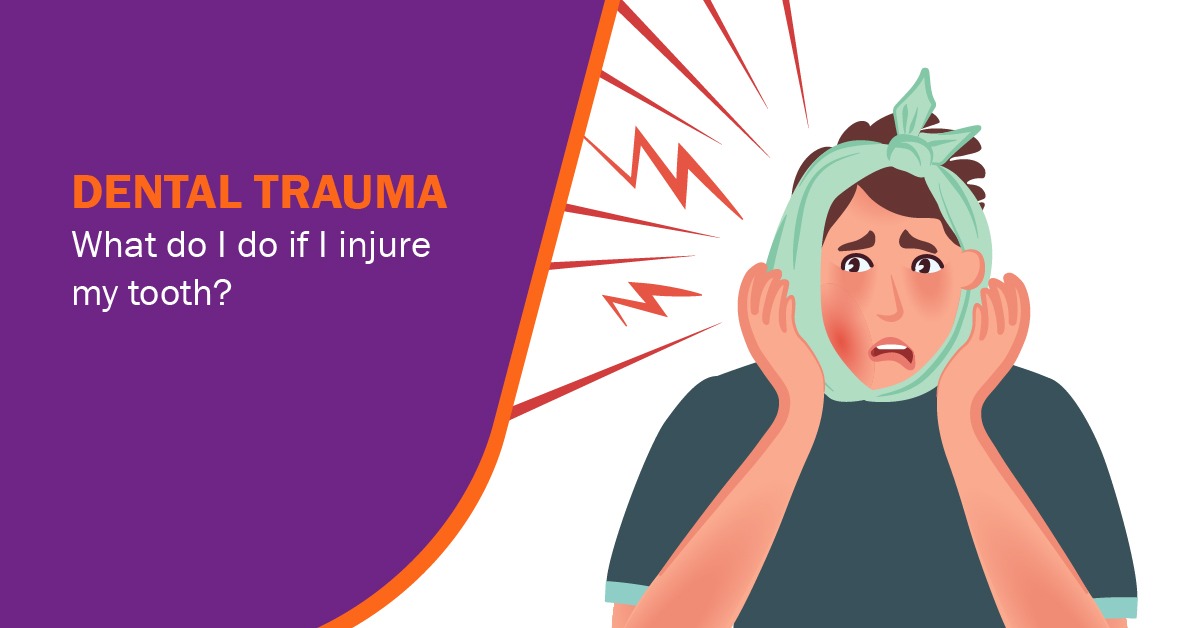Traumatic dental injuries often take place due to contact sports (e.g. rugby, MMA), accidents (e.g. road traffic accidents, biting into something hard) or falls. Here is what you can do at different stages after a dental injury / trauma takes place.
Immediately after the dental injury / trauma
Previously, we shared various tips that will be helpful in providing temporal relief right after you experience a dental injury or dental trauma.
Be it in the form of a loosened or knocked out tooth, chipped tooth, broken dentures and/or injured lips and tongue, read this blog post to be equipped with the relevant know-hows so that you can minimise the damage done while waiting to see your dental specialist/dentist.
Treatment for dental injury / trauma
Most of the injuries are minor (ie. chipped tooth), while severe injuries where a tooth is loosened or dislodged are less common. You are advised to seek professional help from your dental specialist / dentist as soon as you can after an injury. He/she will examine your dental condition and recommend the needed treatment depending on the type, location and extent of the injury.
Chipped or fractured tooth
When a tooth is slightly chipped or fractured at the crown, it can be repaired either by reattaching the broken piece or using a tooth-coloured (composite) filling. However, in cases where a large part of the crown is broken, an artificial dental crown may be needed to restore the tooth.
If the dental pulp is exposed or damaged after a tooth fracture, root canal treatment may be required. If it is a cracked tooth, your dental specialist may try to save the tooth by carrying out root canal treatment and subsequently protecting it with a new dental crown. However, if the crack is too severe and extends below the gum line, extraction will be required. Dental implants and dental bridges are ways to replace the missing tooth.
Related: Answered: 6 Most Common Questions on Cracked Tooth (specialistdentalgroup.com)
Dislodged (luxated) tooth
If your tooth is pushed sideways, out of or into its socket, your dental specialist / dentist will help to reposition and stabilise the tooth. Root canal treatment is usually needed for dislodged permanent teeth. Either a root canal filling or customised dental crown will be needed when root canal treatment is completed.
Knocked out (avulsed) tooth
If your tooth is knocked out completely, see your dental specialist / dentist immediately. An alternative will be to visit the nearest hospital’s Accident & Emergency Department. There is a higher chance to save your tooth if you are attended to within 30 minutes.
Your dental specialist / dentist will help to examine the condition of the tooth. If possible, he/she will place it back into its socket and stabilise it with a dental splint. You will need to return for a subsequent check-up so that your dental specialist / dentist can assess if the tooth is successfully re-implanted. In some cases, root canal treatment may be required.
Tooth root fracture
When a horizontal fracture occurs on the root of your tooth, the location of the fracture determines whether your tooth can be saved. The closer a fracture is to the root tip, the better the chances of success and it has higher chance to last longer. On the contrary, a fracture closer to the gum line weakens the tooth significantly and compromises its longevity.
Your dental specialist / dentist may stabilise the tooth with a splint while the tooth heals.
Post-treatment after dental injury / trauma
Patients frequently wonder how long their injured or saved tooth can last after treatment. This is greatly dependent on a few factors such as:
- nature of the injury
- length of time from injury to treatment
- how tooth was treated after injury
- body’s response
Therefore, it is important to return to your dental specialist / dentist to have the tooth and its surrounding tissues examined regularly, for a period of up to five years. This will allow timely treatment to be carried out, if any is required.
Insurance claims for dental injury / trauma
If you experience a dental injury / trauma and have a personal accident plan, we can help with the necessary paperwork for submission to your insurance provider. The outcome of such claims is subject to the final approval of the insurance companies.
As such claims are time sensitive, it is important to seek professional dental help as soon as you can after a dental injury / trauma.
Our team of dental specialists
Specialist Dental Group has a team of dental specialists who are experienced in managing patients with dental trauma and dental injury. Many of them are on Parkway Hospital’s Accident & Emergency Department’s call rooster to provide timely and effective help for patients who require urgent help.






